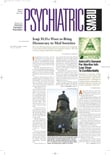Health and Human Services (HHS) Secretary Tommy Thompson has announced the creation of a task force to advise HHS on how drug importation (or reimportation) might be conducted safely.
Thompson is complying with a provision in the Medicare Prescription Drug, Improvement, and Modernization Act of 2003, which directs HHS to lead a comprehensive study of the issue. The task force will have a broad mandate to solicit information from both supporters and opponents of importation, according to HHS.
Meanwhile, the Senate Budget Committee approved a resolution in favor of drug reimportation (
see facing page).
Drug importation was one of the more bitterly contested issues in the Medicare reform bill. A provision in the law allows importation of prescription drugs from Canada only—and from nowhere else—but with the caveat that imported drugs are certified as safe by the secretary of Health and Human Services.
But the safety certification is considered “the poison pill” of the provision because no HHS secretary, including Thompson, is likely to commit to guaranteeing safety of imported drugs. The provision is considered a windfall for the pharmaceutical industry, which has opposed importation of price-controlled drugs.
Now, as in the past, the Food and Drug Administration (FDA) will likely look the other way when individuals import small amounts of prescription drugs, but pharmacies and managed care organizations will be unable to import large quantities.
“The importation of drugs remains a long-standing safety concern for the Department of Health and Human Services, as we currently cannot guarantee the safety of these medicines,” Thompson said. “This task force will study what it would take in terms of oversight and resources to safely import drugs. It will hear from all sides of the issue in a public, transparent manner. I’m confident that it will produce a balanced picture of the costs and benefits of drug importation.”
The Medicare reform bill directed HHS to complete the study by December and address the following issues, among others, related to drug importation:
• Identify barriers to the secretary’s ability to certify the safety of imported drugs.
• Assess the scope, volume, and safety of unapproved drugs, including controlled substances, entering the United States via mail shipment.
• Determine the extent to which foreign health agencies are willing and able to ensure the safety of drugs being exported from their countries to the United States.
• Assess the potential short- and long-term impacts on drug prices.
• Assess the impact on drug research and development, and the associated impact on consumers and patients, if importation were permitted.
• Estimate agency resources, including additional field personnel, needed to inspect the current amount of pharmaceuticals entering the country.
The task force will be chaired by Mark B. McClellan, M.D., Ph.D., commissioner of the FDA. Five meetings will be held, one each with representatives from the following groups: consumer groups; professional health care groups; health care purchasers, including representatives of cities and states; industry associations; and international stakeholders. There will also be a meeting for the general public to provide comments. ▪
